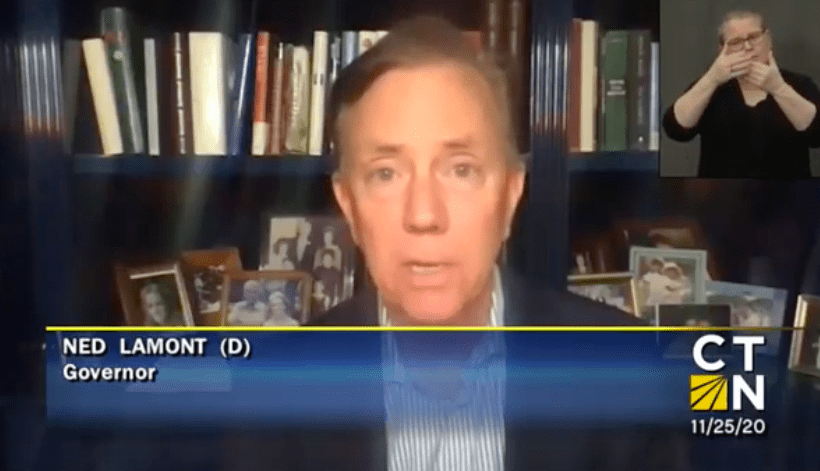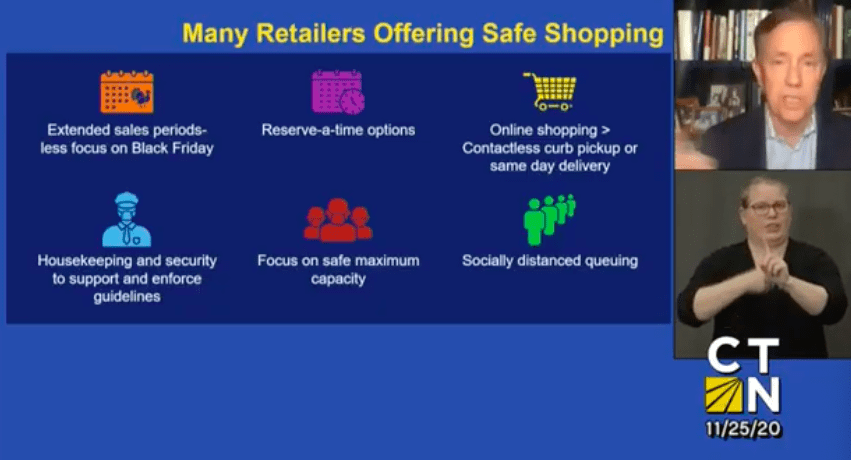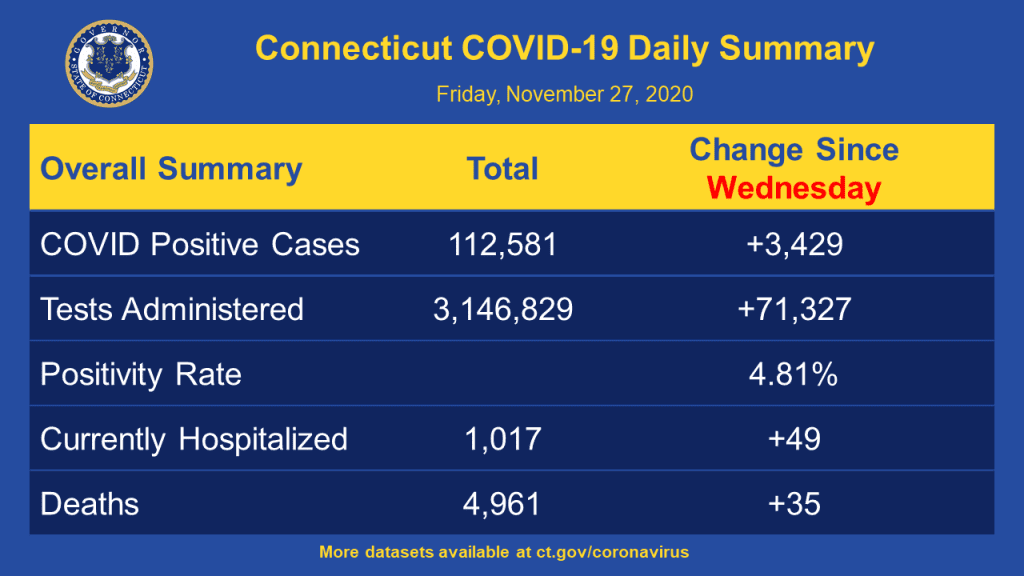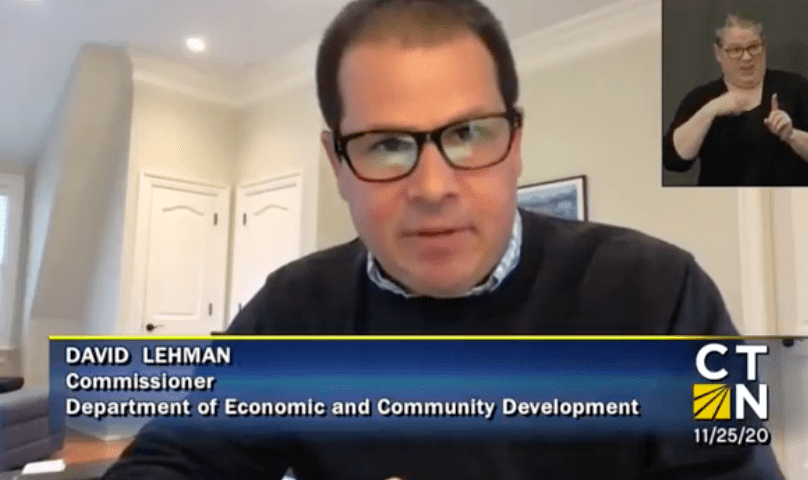Businesses Worry Lamont Crackdown Could Have Unintended Consequences

Audio By Carbonatix

According to data reported Thursday, 1,632 West Hartford residents have tested positive for COVID-19.

By Hugh McQuaid, CTNewsJunkie.com
Gov. Ned Lamont’s administration warned Connecticut businesses it may enforce $10,000 fines on “gross violations” of public health guidelines as the state posted spikes in COVID-related deaths and hospitalizations Wednesday ahead of the Thanksgiving holiday.
During a Wednesday press briefing, Lamont provided an update on Connecticut’s coronavirus situation. The state saw a sharp jump in hospitalizations, admitting 77 new COVID patients. He also reported another 45 deaths associated with the virus.
This steep jump, almost double the recent typical number, is likely the result of uneven reporting, Josh Geballe, state chief operating officer, said. The daily infection rate was just under 6%.
The state did not provide a COVID-19 update on Thursday due to the Thanksgiving holiday, but Friday’s two-day report indicated another 3,429 positive cases, with a positivity rate of 4.81%. In West Hartford, there were 41 additional cases reported for the two-day period.
Friday’s report indicated another 49 people statewide were hospitalized over the two-day period, with the total number of patients topping 1,000 for the first time since the middle of May. There were 35 COVID-related fatalities as well.

In light of the concerning numbers and trends, Lamont sought to reinforce a message he sent Tuesday through an executive order which raised the maximum fine for businesses violating pandemic rules like capacity limits from $500 to $10,000.
During Wednesday’s press conference, Lamont said the vast majority of restaurants and retailers were doing everything they could to operate safely. However, some restaurants have made news for flaunting state guidelines. Town officials in Manchester announced Tuesday they had shut down the Hungry Tiger restaurant for failure to abide COVID-19 guidelines.
The governor said he made the fines for violations more severe in an effort to protect the operations for businesses that were following the rules.
“If there are bad actors, there will be consequences. That’s one way we’re able to keep our restaurants open,” he said.
But Scott Dolch, executive director of the Connecticut Restaurant Association, worried in a Wednesday phone interview that attention paid to the bad actors may come at the expense of all the businesses who were trying to follow the rules. He said restaurants like the Hungry Tiger, who refuse to follow public health guidelines, are not indicative of the industry.
“Those aren’t our restaurants, in my opinion, those aren’t the ones that have been doing everything asked of them for the last eight months. They’re looking for help and support from the administration, from everybody, to help them see the other side of this pandemic,” he said.
Dolch called from a ribbon-cutting ceremony in Enfield where Wood-n-Tap was opening a new location Wednesday. He said one of the owners was in the dining area measuring the distance between tables to ensure they complied with social distancing rules.
“He’s out here right now,” Dolch said. “They’re literally rearranging tabletops to make sure spacing is fair, where it needs to be, and still have a good customer experience. This is the norm. This is what most of these restaurateurs are doing. The last thing I need is more messaging focused on the bad actors as opposed to the good.”
Tim Phelan, president of the Connecticut Retail Merchants Association, was also looking Wednesday to focus on what was going right ahead of the busiest shopping season of the year. He said customers should feel confident that retailers were complying with the state guidelines.
“I think this is just what the governor feels he has to do. We would rather try to focus our attention and the consumers’ attention on the fact that our stores have been reopened since May. They’ve had to comply with these guidelines, which include capacity and social distancing. They’re going to continue to do that through this holiday season,” he said.

During the Wednesday press conference, Economic and Community Development Commissioner David Lehman said officials around the state would prefer to hand out warnings to most businesses who unintentionally fall short of compliance. In many cases, they already have, he said.
But the state has also handled a fair amount of complaints from customers who report violations by phone. Customers have reported between 300 and 500 violations a week, Lehman said. Still, he anticipated the hefty fine would be used for more severe transgressions.
“The intent of the $10,000 fine is really for gross violations of the gathering size limits as well as the capacity limits,” he said. “A lot of warnings have been given out but if there’s still people who are non-compliant, they should expect these fines to be a real possibility.”
Dolch said struggling restaurants were looking to the Lamont administration to offer a carrot in addition to a stick. While the governor was raising the fines for violations, he has not raised the incentives for restaurants to stay in business. Dolch said Connecticut lagged behind other states in financial assistance for businesses during the pandemic.
Asked about greater assistance Wednesday, Lamont said he was doing what he could.
“Everybody wants more help with state resources. I appreciate that. Right now the best thing I can do for the restaurants is to allow them to stay open as long as they can stay open safely,” he said.
Republished with permission from CTNewsJunkie.com, all rights reserved.
Like what you see here? Click here to subscribe to We-Ha’s newsletter so you’ll always be in the know about what’s happening in West Hartford! Click the blue button below to become a supporter of We-Ha.com and our efforts to continue producing quality journalism.



